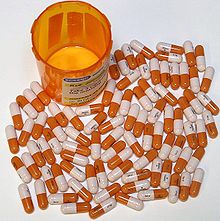- Pharmaceutical lobby
-
The pharmaceutical lobby — also known as the drug lobby — refers to the paid representatives of large pharmaceutical and biomedicine companies in the United States who seek to influence federal government policy.
Contents
Political influence in the U.S.
The top twenty pharmaceutical companies and their two trade groups, Pharmaceutical Research and Manufacturers of America (PhRMA) and Biotechnology Industry Organization, lobbied on at least 1,600 pieces of legislation between 1998 and 2004. According to the non-partisan Center for Responsive Politics, pharmaceutical companies spent $900 million on lobbying between 1998 and 2005, more than any other industry. During the same period, they donated $89.9 million to federal candidates and political parties, giving approximately three times as much to Republicans as to Democrats.[1] According to the Center for Public Integrity, from January 2005 through June 2006 alone, the pharmaceutical industry spent approximately $182 million on Federal lobbying.[2] The industry has 1,274 registered lobbyists in Washington D.C. [3]
Controversy in the U.S.
Prescription drug costs in the U.S.
Critics of the pharmaceutical lobby argue that the drug industry's influence allows it to promote legislation friendly to drug manufacturers at the expense of patients. The lobby's influence in securing the passage of the Medicare Prescription Drug Improvement and Modernization Act of 2003 was considered a major and controversial victory for the industry, as it prevents the government from negotiating prices with drug companies who provide those prescription drugs covered by Medicare. As a result, 61 percent of Medicare spending on prescription drugs is direct profit for pharmaceutical companies.[4]
The high price of U.S. prescription drugs has been a source of ongoing controversy. Corporations claim the high costs are the result of pricey research and development programs, while critics point out, in addition to the industry's profits, the high proportion of pharmaceutical budgets devoted to marketing and lobbying.[5] According to Marcia Angell, the former head of the New England Journal of Medicine, "The United States is the only advanced country that permits the pharmaceutical industry to charge exactly what the market will bear."[6]
Influence over doctors in the U.S.
The pharmaceutical industry's sponsorship of clinical research has come under increased scrutiny in recent years, as authors of publications favorable to the industry often receive compensation from major drug companies, thereby raising doubts about their research's objectivity.[7][8] Additionally, advocacy groups within and beyond the medical profession have asserted that direct advertising to physicians, free samples, and research stipends encourage doctors to over-prescribe medications.[9][10][11]
See also
References
- ^ Drug Bill Demonstrates Lobby's Pull - washingtonpost.com
- ^ Pushing Prescriptions - The Center for Public Integrity
- ^ USATODAY.com - Drugmakers go farthest to sway Congress
- ^ Pushing Prescriptions - The Center for Public Integrity
- ^ High Prices: The New Yorker
- ^ frontline: the other drug war: interviews: marcia angell | PBS
- ^ AMA Council Suggests Way To Reduce Research Bias - 39 (14): 19 - Psychiatr News
- ^ Study links funding sources to positive findings at scientific meetings.
- ^ San Francisco Medical Society | The Pharmaceutical Industry's Influence on Physician Behavior and Health Care Costs
- ^ The Chronicle of Higher Education
- ^ How drug lobbyists influence doctors - The Boston Globe
External links
Categories:
Wikimedia Foundation. 2010.

